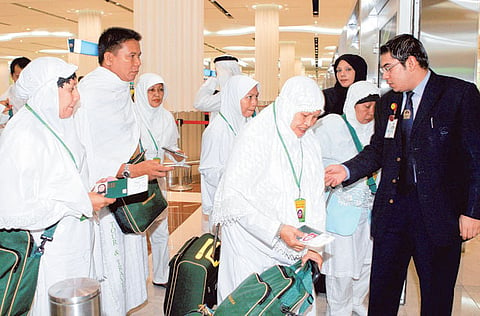Saudi downplays impact of virus on Haj
Pilgrims have begun to arrive in Saudi Arabia for ritual

Riyadh: Saudi health authorities downplayed on Tuesday the impact of a possible outbreak of a virus from the family of deadly SARS on its forthcoming Haj pilgrimage, stressing that the cases remain rare.
Pilgrims have begun to arrive in Saudi Arabia for the ritual that represents the world’s largest annual gathering as some two million faithful are expected to descend on Makkah for the Haj which peaks in late October.
“There have been two cases of flu over a period of time. This is normal,” said health ministry spokesman Khalid Al Mirghalani.
“There are no changes to the conditions put by the health ministry to pilgrims,” he said, adding that authorities remain vigilant.
The undersecretary for preventive medicine at the Saudi health ministry, Ziyad Memish, said the “virus has been in the kingdom for three months.”
He, however, insisted the situation was “stable and no new cases have been recorded.” Memish said the kingdom is not planning to impose new preventive measures on pilgrims.
The virus has caused the death of a Saudi national and has left a Qatari man in serious conditions at a London hospital, said the World Health Organization (WHO).
The 49-year-old Qatari was admitted to an intensive care unit in Doha on September 7 suffering from acute respiratory infection and kidney failure before being transferred to Britain by air ambulance on September 11, the WHO said.
The WHO confirmed the illness was in the coronavirus family but was not SARS, or Severe Acute Respiratory Syndrome, which swept out of China in 2003, killing more than 800 people worldwide.
“This is not SARS, it will not become SARS, and it is not SARS-like,” said Gregory Haertl, a WHO spokesman in Geneva, pointing out that what sets the new virus apart was that it caused rapid kidney failure.
Qatar’s top health authority announced on Monday that no other cases have been reported in the Gulf state, apart from the citizen who fell ill in Saudi Arabia.
The head of the country’s public health authority, Mohammed bin Hamad Al Thani, said the infected Qatari had “been treated in Qatar for two months before being transferred to London.”
Last year, nearly three million Muslim pilgrims performed the Haj, which represents one of the five pillars of Islam and must be performed at least once in a lifetime by all those Muslims who are able to do so.
Sign up for the Daily Briefing
Get the latest news and updates straight to your inbox



